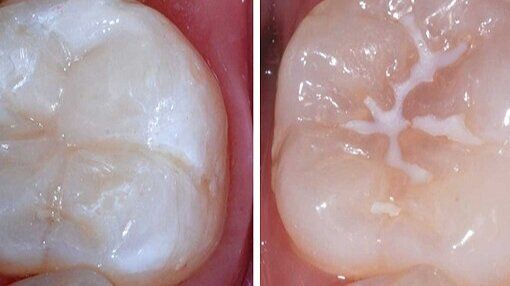Why I need Root Canal Treatment?
7 November 2023
Root Canal Treatment

What is a Root Canal Treatment?
A root canal treatment, also known as endodontic therapy, is a dental procedure performed to save a severely damaged or infected tooth. The treatment involves removing the infected pulp and nerves inside the tooth, cleaning and disinfecting the tooth's interior, and then sealing it. This process prevents the infection from spreading and can save the natural tooth.
When is Root Canal Treatment Necessary?
Root canal treatment becomes necessary when the pulp (the innermost part of the tooth) becomes infected or damaged. This can happen due to various reasons, such as deep cavities, cracked or chipped teeth, or repeated dental procedures on the same tooth. If left untreated, the infection can lead to severe pain and the formation of dental abscesses. Get in touch with your dentist
asap.
Signs and Symptoms
Common signs and symptoms that may indicate the need for root canal treatment include:
-Persistent Toothache
A severe, throbbing toothache that lingers or worsens over time.
-Sensitivity to Hot and Cold
Increased sensitivity to hot and cold temperatures, especially when consuming food or drinks.
-Swollen Gums
Swelling and tenderness in the gums surrounding the affected tooth.
-Darkening of the Tooth
Discoloration or darkening of the infected tooth.
-Pimple on the Gums
The formation of a pimple-like bump on the gums, often filled with pus.
Causes of Dental Pulp Infection
Several factors can lead to dental pulp infection, including untreated cavities, tooth fractures, and traumatic injuries. The key is to address these issues promptly to prevent the need for a root canal.
Importance of Early Detection
Early detection of dental problems can significantly reduce the chances of needing a root canal. Regular dental check-ups and maintaining good oral hygiene are essential in catching issues before they become severe.
The Root Canal Procedure
1. Consultation and X-rays
The dentist
will evaluate the tooth's condition, take X-rays, and discuss the treatment plan with the patient.
2. Local Anesthesia
The affected tooth and its surroundings are numbed to ensure a pain-free procedure.
3. Pulp Removal
The infected pulp is carefully removed to eliminate the source of the infection.
4. Cleaning and Disinfection
The interior of the tooth is thoroughly cleaned, disinfected, and shaped to prepare for the filling.
5. Filling
The tooth is sealed with a biocompatible material, preventing further infection.
6. Restoration
In many cases, a crown
is placed on the treated tooth to restore its strength and appearance.
The whole root canal procedure can take 2-3 appointments.
Benefits of Root Canal Treatment
-Pain Relief
Root canal treatment provides relief from the severe pain caused by dental infections.
-Tooth Preservation
It allows you to keep your natural tooth, avoiding the need for extraction.
-Efficient Chewing
Restoring the tooth's functionality ensures proper chewing and maintains overall oral health.
Recovery and Aftercare
After a root canal, patients may experience some discomfort, but this is manageable with over-the-counter pain relievers. It's important to follow the dentist's post-treatment instructions for a smooth recovery.
Preventing the Need for Root Canal Treatment
Maintaining good oral hygiene practices, such as regular brushing, flossing, and dental check-ups, is key to preventing the need for a root canal.
Cost of Root Canal Treatment
The cost of a root canal can vary depending on factors such as the tooth's location and the complexity of the procedure. Dental insurance may cover a portion of the cost.
Success Rate of Root Canal Procedures
Root canal treatments have a high success rate, with most patients experiencing relief from pain and retaining their treated teeth for years to come.
Frequently Asked Questions about Root Canal Treatment
1. Is root canal treatment painful?
Root canal treatment is performed under local anesthesia, ensuring that the procedure is generally pain-free. After the treatment, some discomfort may occur, but it can be managed with over-the-counter pain relievers.
2. Can a tooth that has had a root canal still get infected?
While it is rare, a tooth that has undergone a root canal can become re-infected. Regular dental check-ups are essential to monitor the tooth's condition and address any issues promptly.
3. How long does a root canal procedure take?
The duration of a root canal procedure depends on various factors, including the tooth's location and complexity. On average, it may take 2-3 dental appointments.
4. Are there alternatives to root canal treatment?
The main alternative to root canal treatment is tooth extraction. However, saving the natural tooth is usually the preferred option, as it maintains oral health and function.
5. Can I eat normally after a root canal?
After a root canal procedure, it's advisable to avoid hard or sticky foods for a few days. Your dentist will provide specific guidelines for post-treatment care and dietary restrictions.
Root canal treatment is a vital dental procedure that can save a severely damaged or infected tooth. If you're wondering why you might need root canal treatment, it's often the best way to alleviate pain, preserve your natural tooth, and maintain your overall oral health. Remember to consult with an experienced dentist
to discuss your specific needs and concerns.
For more information on dental treatment and procedure, please do not hesitate to contact our team at Banyo Dental On 07 32675473.

If your tooth or filling is broken or chipped, you should see your dentist as soon as possible. Leaving your broken tooth or filling for a long period of time, it can result in decay leading to inflammation of the nerve in the tooth and can lead to pain, abscess, resulting in root canal treatment or loss of teeth.

Sports drinks are becoming an indispensable part of playing sports and physical activity for people. Keeping ones body fit and healthy is crucial for an athlete, as successful performance demands training and eating a healthy diet and keeping hydrated. At the same time maintaining good oral health is as important as strengthening the body for optimum athletic performance. Sports drinks have been designed to help professional athletes to recover from their intense athletic activities. Even though consuming sports drinks may help you improve your performance but it is really important to weigh the risks your taking to your oral health.






